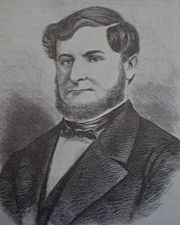Pastor Obligado
| Pastor Obligado | |
|---|---|
 |
|
| Governor of the State of Buenos Aires | |
|
In office June 28, 1853 — December 21, 1858 |
|
| Preceded by | Manuel Guillermo Pinto |
| Succeeded by | Valentín Alsina |
| Personal details | |
| Born | August 9, 1818 Buenos Aires |
| Died | March 12, 1870 (aged 51) Jesús María, Córdoba |
| Political party | Unitarian Party |
| Spouse(s) | Fortunata Gómez |
| Alma mater | University of Buenos Aires |
| Occupation | Lawyer |
Pastor Obligado (August 9, 1818 — March 12, 1870) was an Argentine lawyer and lawmaker who served as Governor of the secessionist State of Buenos Aires from 1853 to 1858.
Obligado was born in Buenos Aires to Juana María Tejedor and Manuel Obligado. The elder Obligado had enrolled at the bar at the Royal Audiencia of Charcas, was among the signatories of the Open Cabildo of May 22, 1810, that ushered the May Revolution, and served as Economy Minister for the subsequent Directorate.
The younger Obligado married the former Fortunata Gómez in 1839, and they had four children. He earned a law degree at the University of Buenos Aires in 1845, and despite having publicly supported Governor Juan Manuel de Rosas, Obligado was appointed provincial circuit judge the day after Rosas' 1852 overthrow. He advocated against Buenos Aires' ratification of the San Nicolás Agreement, and became one of a leading group of Unitarian Party lawmakers most opposed to any pact signed with the now paramount Entre Ríos Governor, Justo José de Urquiza.
This group, which also included Adolfo Alsina, Valentín Alsina, José Mármol, and Carlos Tejedor, spearheaded the September 11, 1852, establishment of the State of Buenos Aires, seceding from the Argentine Confederation led by Urquiza. Obligado's advocacy on behalf of the Port of Buenos Aires and the Buenos Aires Customs (the chief sources of public revenue), as well as the support from Domingo Sarmiento and Rufino de Elizalde helped result in his election as Governor by the Legislature on June 28, 1853.
...
Wikipedia
